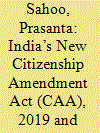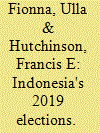|
|
|
Sort Order |
|
|
|
Items / Page
|
|
|
|
|
|
|
| Srl | Item |
| 1 |
ID:
170825


|
|
|
| 2 |
ID:
176154


|
|
|
|
|
| Summary/Abstract |
India’s newly enacted Citizenship Amendment Act (CAA), 2019 and the National Register of Citizens (NRC) has put the most trusted India-Bangladesh relations on the test. Though both the neighbours share a largely cordial relationship with a shared history, culture, and a common destiny, the recent law has brought serious stress in the bilateral relations.
|
|
|
|
|
|
|
|
|
|
|
|
|
|
|
|
| 3 |
ID:
169228


|
|
|
|
|
| Summary/Abstract |
In April 2019, Indonesia carried out simultaneous presidential and legislative elections. With an estimated 192 million voters acceding to 800,000 polling stations, this was the world's largest direct presidential election. Barring some dispersed claims of irregularities, the mammoth task of electing public representatives at the national as well as provincial and local levels was successfully carried out. Indonesia's voters had to decide on the 575 members of the national parliament, as well as some 20,000 seats in the country's many provincial and local legislatures, including 2,207 provincial level MPs from 34 provinces and 17,610 local councillors from more than 500 local authorities. Voter turn-out was an estimated 81.9 percent, the highest yet since Indonesia's transition to full democracy. Thus, at first blush, this electoral exercise can be seen as a logistical and political achievement, and an addition to Indonesia's track record of successfully-held elections. Yet, despite its technical proficiency and solid participation, the 2019 polls highlight pervasive societal and geographic fault-lines and raise questions about the strength of Indonesia's democratic institutions.
In order to analyse the importance of these elections, this article is comprised of six parts. Following this introduction, the second section briefly discusses the salient aspects of Jokowi's first administration. The subsequent part sets out the run-up to the presidential campaign, paying particular importance to changes in ‘rules of the game’ that altered the structural dynamics of the elections. The fourth section compares and contrasts the campaigns of the two opposing coalitions and the fifth analyses the electoral results. The final section concludes by discussing the denouement of the elections before looking forward.
|
|
|
|
|
|
|
|
|
|
|
|
|
|
|
|
| 4 |
ID:
172556


|
|
|
|
|
| Summary/Abstract |
This article uses the 2019 Eurovision Song Contest (ESC) that took place in Tel Aviv to explore how cultural mega-events serve both as political arenas and as tools for identity construction, negotiation and contestation. These processes of identity politics are all conducted across national–subnational–international–transnational levels. The hosting of mega-events fleshes out these multiple processes in a very strong manner. We first discuss the politics of hosting mega-events in general. We then examine the identity politics associated more specifically with the Eurovision Song Contest, before examining in depth the complex forms of identity politics emerging around the competition following the 2018 Israeli victory. We suggest that it is important to study together the multiple processes—domestic, international and transnational—of identity politics that take place around the competition, as they interact with each other. Consequently, we follow the various stakeholders involved at these different levels and their interactions. We examine the internal identity negotiation process in Israel surrounding the event, the critical actors debating how to use the stage to challenge the liberal, western, ‘normal’ identity Israel hoped to project in the contest and how other stakeholders (participating states, national broadcasting agencies, participating artists) reacted to them, and finally we examine the behaviour of the institution in charge, the European Broadcasting Union, and national governments. We contribute to the study of mega-events as fields of contestation, to the understanding of the complex, multilevel nature of national identity construction, negotiation and contestation in the current era, and more broadly to the role that popular culture plays in this context.
|
|
|
|
|
|
|
|
|
|
|
|
|
|
|
|
| 5 |
ID:
173663


|
|
|
|
|
| Summary/Abstract |
In 2019 the United Arab Emirates undertook to recalibrate its intervention in the Yemen conflict, without ending it altogether.
|
|
|
|
|
|
|
|
|
|
|
|
|
|
|
|
|
|
|
|
|